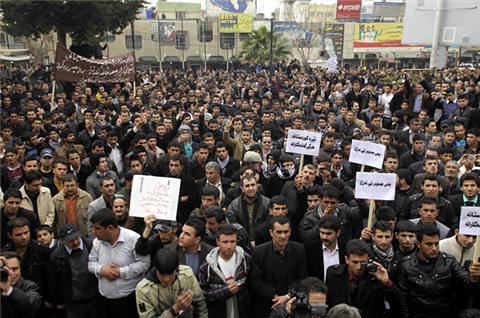
Demonstrations in southern Iraqi cities have targeted the poor conditions prevailing since the U.S. occupation of the country. The people of the region have rose up against neo-colonialism., a photo by Pan-African News Wire File Photos on Flickr.
Tensions rise as Iraq seeks Sunni VP arrest
8:24pm EST
By Rania El Gamal
BAGHDAD (Reuters) - Iraqi authorities issued an arrest warrant for Sunni Muslim Vice-President Tareq al-Hashemi on Monday for suspected ties to assassinations and bombings, a decision likely to fuel sectarian tensions after the U.S. troop withdrawal.
The move risks unraveling Iraq's fragile power-sharing deal among Shi'ite, Sunni and Kurdish blocs who have struggled to overcome tensions just a few years after sectarian slaughter drove the country to the edge of a civil war.
Interior Ministry spokesman, Major General Adel Daham, told a news conference confessions by suspects identified as Hashemi's bodyguards linked the vice president to killings and attacks on Iraqi government and security officials.
"An arrest warrant was issued for Vice President Tareq al-Hashemi according to Article 4 of the terrorism law and is signed by five judges... this warrant should be executed," Daham said, waving a copy of the document in front of reporters.
The political struggle between Shi'ite Prime Minister Nuri al-Maliki and his Sunni rivals in the country's delicate power-sharing deal has intensified during the withdrawal of the last U.S. troops nearly nine years after the invasion.
The ministry showed taped confessions, aired on state-run Iraqiya television and other local media, of men it claimed were members of Hashemi's security detail. The men said they had been paid by his office to carry out killings.
The three men shown on television detailed the assassinations they were told to carry out by Hashemi's aides including planting roadside bombs and driveby shootings of security and government officials.
One man said he was handed $3,000 as a reward by Hashemi himself.
But the identity of the men could not be independently confirmed.
Hashemi, who could not be contacted for a response, was in Kurdistan, a semi-autonomous enclave in the north, Kurdish political sources said. Kurdistan has its own government and security forces, making Hashemi's immediate arrest unlikely.
In a statement earlier on Monday, Hashemi accused Maliki's government of "deliberate harassment" after his plane was delayed for three hours at Baghdad airport. He had been heading for the Kurdish city of Sulaimaniya to meet the Iraqi president.
Security forces arrested three Hashemi bodyguards on their way back from the airport, the statement said, adding military forces surrounding Hashemi's house for weeks had been beefed up.
"The vice-president has been very patient and is waiting for a reasonable explanation from the government parties concerned," the statement said.
DEEPENING CRISIS
Fearing a deepening crisis that could push Iraq back into sectarian turmoil, senior Iraqi politicians were holding talks with Maliki and other leaders to contain the dispute.
The U.S. ambassador in Iraq was in contact with senior Iraqi leaders, the U.S. embassy in Baghdad said, without providing details on which figures or the matters under discussion.
Violence has ebbed sharply since the peak of attacks in 2006-07 when suicide bombings and hit-squads claimed thousands of victims in tit-for-tat killing between Sunni and Shi'ite communities.
But sectarian tensions are close to the surface and still color many aspects of Iraqi political life.
The completion of the U.S. withdrawal on Sunday left many Iraqis fearful that a shaky peace deal between majority Shi'ites and minority Sunnis might collapse and reignite sectarian violence.
Maliki over the weekend asked parliament for a vote of no-confidence against another leading Sunni politician, Saleh al-Mutlaq, who is deputy prime minister, on the grounds that he lacked faith in the political process.
Hashemi and Mutlaq are both leaders of the Iraqiya bloc, a secular group backed by minority Sunnis, which joined Maliki's unity government only reluctantly and recently boycotted parliament sessions after complaining of being marginalized
Many Sunnis, who were in power under Saddam, feel shunted aside by the rise of Shi'ites after the invasion. Already some Sunni-dominated regions in Iraq are seeking more autonomy from the central government, chaffing against what they see as an increasingly authoritarian tack taken by Maliki.
(Additional reporting Kareem Raheem; Writing by Patrick Markey; Editing by Serena Chaudhry/Maria Golovnina)
No comments:
Post a Comment